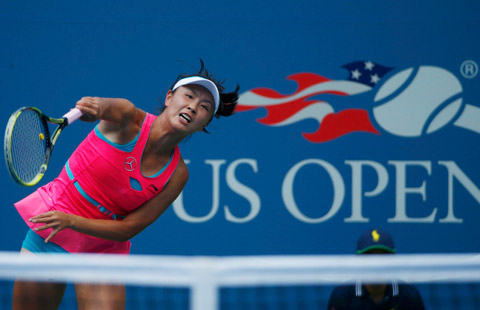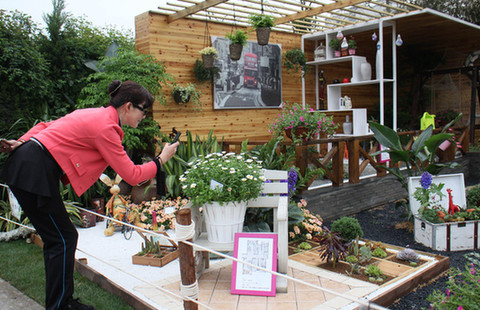Caring out of the ordinary
Updated: 2014-09-04 07:30
By Zhao Xu(China Daily)
|
|||||||||||
Wang's organization is one of the major Chinese beneficiaries of donations from the popular Ice Bucket Challenge campaign helping sufferers of amyotrophic lateral sclerosis disease.
Zheng Yu, whose 15-year-old daughter, Gu Ruofan, first showed signs of a rare disease called mucopolysaccharidosis in kindergarten, believes that an adult very often fails to gauge the grit of a minor.
"My girl was diagnosed at 4, but we kept it from her for another four years, until 2007, when I took her to a symposium in Taiwan focused on the disease. We were sitting below while medical experts from around the world discussed its many symptoms and possible alleviations, including hindered growth, a thicker neck and unusable legs," Zheng said.
"Suddenly, my daughter looked up at me and asked, 'Mom, is this the same one that I've got?' "
|
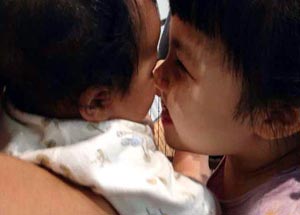 |
| An An, 4, kisses her sister Jia Jia. An An was diagnosed with Rett syndrome when she was 16 months old. PROVIDED TO CHINA DAILY |
|
15 million The estimated number of people with rare diseases in China 7,000 Up to this number of types of rare diseases have been identified worldwide The 15 million figure often cited for China is a rough estimate at best, since we have no official definition for ‘rare diseases’ and have conducted no comprehensive census on the number of sufferers.” WEI MIN A LEADING PEDIATRICIAN WITH PEKING UNION MEDICAL COLLEGE HOSPITAL It’s important to remember that parental love, however fierce and devoted, can never fill the void left in a child’s heart by the lack of friends.” MENG YAN A GENETIC DISEASE EXPERT FROM THE 301 HOSPITAL The idea that your rare-disease child needs to take no responsibility for his or her health is a myth, and encourages nothing but self-pity. It’s up to parents to instill in their kids a strong sense of regimen, which they then need to plan their lives around their disease.” ZHAO NING A PARENT WHOSE 8-YEAR-OLD DAUGHTER WAS DIAGNOSED WITH PHENYLKETONURIA, A METABOLIC GENETIC DISORDER |
" 'Are you OK?' I asked. 'Yeah ... I think I've been doing far better than many of them, right? ' my daughter answered. And that was it," remembered the 41-year-old. "Then I knew I was the weak one."
If acknowledging the stark reality of a rare disease represents the first step forward, then what comes next should be opening up to the world around, said Meng Yan, a genetic disease expert from the 301 Hospital in Beijing. Again, parents play a crucial role.
"A rare-disease child, especially those with conspicuous physical changes, draws confidence from his loved ones to face up to the inquisitive stares he or she is certain to encounter out on the streets," she said.
"It's important to remember that parental love, however fierce and devoted, can never fill the void left in a child's heart by the lack of friends."
Gu Ruofan said her daily walks from the classroom to the playground constituted both her happiest and saddest moments.
"I'm the happiest when my best friend is at my side. But when we have a quarrel and she runs away, leaving me shuffling behind, dragging my legs, I'm the saddest," she said.
A sense of regimen
A rare-disease child who has decided to "go out" is almost certain to suffer occasional emotional pain, said Zheng, who insists that her daughter goes to school.
"For anyone, with or without a disease, respect is something to be earned," she said. "If life's a battle, then I've put her on the front line fighting for herself, while letting her know that I'm always here with her. Love is the best balm when there's a wound."
Yet no love should stand in the way of parents taking disciplinary action against their "rare kids", conceded Zhao Ning, whose 8-year-old daughter was diagnosed with phenylketonuria, a metabolic genetic disorder, upon birth. Sufferers of the disease lack in their body a special type of enzyme necessary for metabolizing amino acid.
"Patients should wean themselves off any 'normal food', and instead eat only 'synthesized food', which contains a much lower protein level yet tastes worse than starch. But in reality, many parents relented after their kids pleaded repeatedly to have, say, a chocolate bar or simply a piece of meat. I'm the opposite of these parents," said the 40-year-old.
"My daughter once stole some cakes from the kitchen. She was just about 5 or 6, but I beat her hand with a stick so hard that it became seriously swollen. After that, I locked myself in my room and slapped my own face 10 times harder.
"The idea that your rare-disease child needs to take no responsibility for his or her health is a myth, and encourages nothing but self-pity," said Zhao, whose daughter, apart from attending regular schools, has learned to play music and even swim.
"It's up to parents to instill in their kids a strong sense of regimen, which they then need to plan their lives around their disease."
In January this year, Li Jia gave birth to her second daughter, Jia Jia.
"She's a healthy baby, having learned to crawl at 5 months old," said the proud mother.
"I understand all the concerns a 'rare parent' has in not having another child, but my little one is working miracles on her elder sister.
"Due to her illness, An An was slow to react. There was this time when Jia Jia called out at her sister, making a prolonged 'Ah' sound while waiting for her reply. This lasted for about half a minute, until An An finally looked up from her seemingly unstoppable hand-wringing," Li said. "That moment was so touching - none of us adults had ever given An An that much time as her little sister. "
Wei, the pediatrician, said she could not put enough emphasis on the role of family, especially parents.
"Worldwide, nearly 7,000 different types of rare diseases have been identified. For the overwhelming majority of them, no cure exists or is likely to be found in the near future," she said.
"If anything, the stark reality has made it more crucial for parents to remember that your rare child has a life to explore, whatever its length. They are responsible for laying the very first brick for the bridge of understanding between a rare kid and his disease, between him and the rest of the world."
And that effort will never go unappreciated, Li said.
"Sometimes, An An would give me a lick on the face, which is her way to plant a kiss. Other times, she'll just nuzzle up toward me, like a little cub, and the tiny sound from her nostrils assures me that she's comfortable and contented," she said.
Early this year, Li got an email from the mother of another child suffering from Rett syndrome, from overseas.
"She wrote about communicating with her brain-damaged daughter, with the help of an eye-tracking machine that could read a person's mind by capturing the movements of his or her eyeballs," Li said.
"At the end of the conversation, the screen came up with these words: 'Mom, I love you'."
Contact the writer at zhaoxu@chinadaily.com.cn
Today's Top News
Putin outlines ceasefire plan for Ukraine crisis
China paves way for sports investors
Can HK afford a credit rating cut?
Joint forces to curb illegal abortions
Sofia Vergara is highest paid TV actress
Obama reaffirms NATO'S steady alliance with Baltics
China, CEE countries discuss new cooperation
France puts warship delivery to Russia on hold
Hot Topics
Lunar probe , China growth forecasts, Emission rules get tougher, China seen through 'colored lens', International board,
Editor's Picks
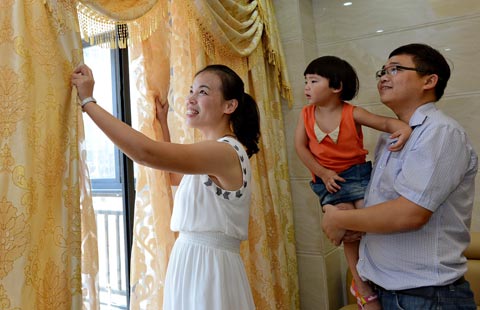
|
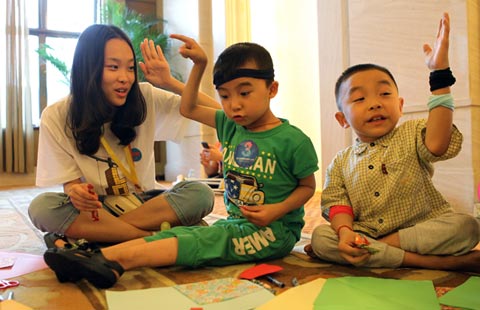
|

|

|

|

|


